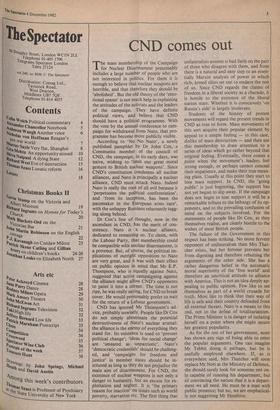CND comes out T he mass membership of the Campaign for
Nuclear Disarmament presumably includes a large number of people who are not interested in politics. For them it is enough to believe that nuclear weapons are horrible, and that therefore they should be 'abolished'. But the old theory of the 'emo- tional spasm' is not much help in explaining the attitudes of the activists and the leaders of the campaign. They have definite political views, and believe that CND should have a political programme. With the vote by the annual conference to cam- paign for withdrawal from Nato, that pro- gramme has become more publicly visible.
According to 'No No Nato', a newly published pamphlet by Dr John Cox, a Communist member of the council of CND, the campaign, in its early days, was naive, wishing to 'limit our great moral gesture to British nuclear weapons'. Since CND's constitution condemns all nuclear alliances, and Nato is principally a nuclear alliance, CND must attack Nato. Indeed Nato is really the root of all evil because it 'perpetuates the political confrontation', and 'from its inception, has been the pacemaker in the European arms race', with the unhappy Russians reluctantly tagg- ing along behind.
Dr Cox's line of thought, now in the ascendant in CND, has the merit of con- sistency. Nato is a nuclear alliance, dedicated to remaining so. To claim, with the Labour Party, that membership could be compatible with nuclear disarmament, is a pretence. But, of course, the political im- plications of outright opposition to Nato are very great, and it was with their effect on public opinion in mind that Mr E.P. Thompson, who is equally against Nato, suggested that active campaigning against the alliance might allow CND's opponents to paint it into a corner. The time is not ripe, he was really saying, for CND to break cover. He would presumably prefer to wait for the return of a Labour government.
CND has ignored Mr Thompson's ad- vice, probably unwisely. People like Dr Cox do not simply abominate the potential destructiveness of Nato's nuclear arsenal: the alliance is the enemy of everything they stand for. Its existence is used to 'prevent political change'; 'ideas for social change' are 'smeared as unpatriotic'. Nato's 'democratic credentials' should be challeng- ed, and 'campaigns for freedom and justice' in member states should be in- stituted as long as they do not prejudice the main aim of disarmament. For CND, the existence of nuclear weapons is not only a danger to humanity, but an excuse for ex- ploitation and neglect. It is 'the primary reason for inaction' on issues such as world poverty, starvation etc. The first thing that unilateralists assume is bad faith on the part of those who disagree with them, and from there is a natural and easy step to an essen- tially Marxist analysis of power in which rich, armed elites set out to enslave the rest of us. Since CND regards the claims of freedom in a liberal society as a charade, it is hostile to the existence of the liberal nation state. Whether it is consciously 'on Russia's side' is largely irrelevant.
Students of the history of protest movements will regard the present trends in CND as true to form. Mass movements of this sort acquire their popular element by appeal to a simple feeling — in this case, dislike of mass destruction — and then use this membership to draw attention to a series of ideas which go rather beyond that original feeling. Eventually, there comes a point when the movement's leaders feel strong enough, or perhaps cannot conceal their impatience, and make their true mean- ing plain. Usually at this point they start to lose mass support. In CND, the 'going public' is just beginning, the support has not yet begun to slip away. If the campaign does not begin to lose support it will be a remarkable tribute to the lethargy of its op- ponents, and to the prevailing confusion of mind on the subjects involved. For the statements of people like Dr Cox, as they themselves realise, are clearly hostile to the wishes of most British people.
The failure of the Government in this respect has been striking. No more fervent opponent of unilateralism than Mrs That- cher exists, but her fervour prevents her from digesting and therefore rebutting the arguments of the other side. She has a rather dangerous belief in the automatic moral superiority of the 'free world' and therefore an uncritical attitude to alliance with America. This is not an idea deeply ap- pealing to public opinion. Few like to see themselves as part of a world crusade for truth. Most like to think that their way of life is safe and their country defended from all external threats. Nato is a means to this end, not to the defeat of totalitarianism. The Prime Minister is in danger of isolating herself on a point where she might secure her greatest popularity.
As for the rest of her government, none has shown any sign of being able to enter the popular arguments. One can imagine Mr Tebbit doing it pdrhaps, but he is usefully employed elsewhere. If, as is everywhere said, Mrs Thatcher will soon replace Mr Nott at the Ministry of Defence, she should surely look for someone not on- ly capable of running his department, but of convincing the nation that it is a depart- ment we all need. He must be a man with public presence; but no, we are emphatical- ly not suggesting Mr Heseltine.










































 Previous page
Previous page